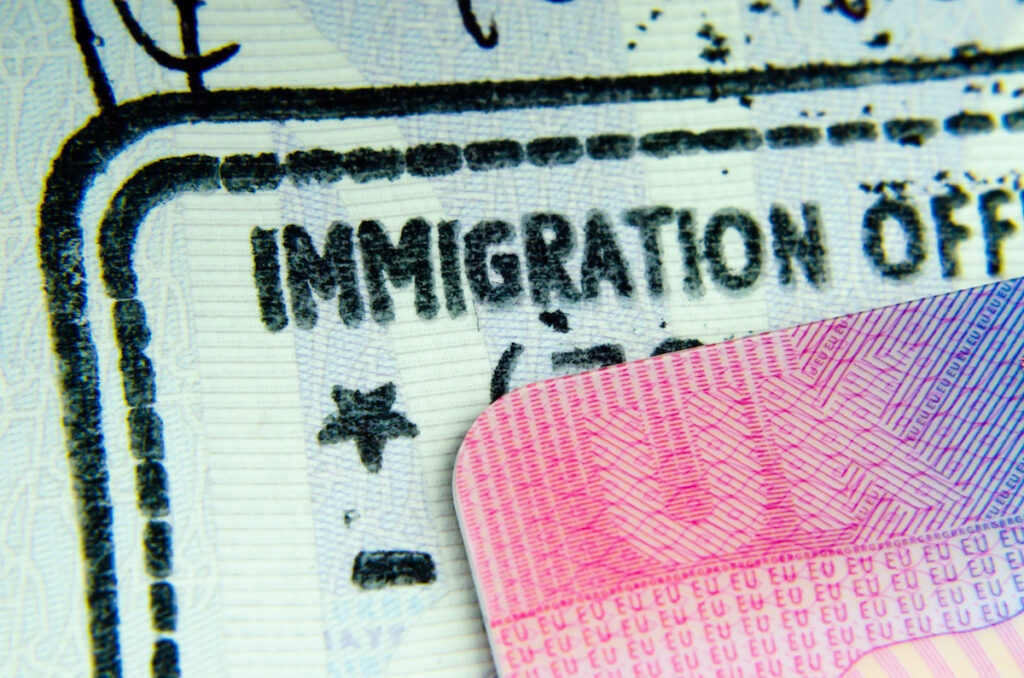
The inequalities in mental health experienced by people from minoritised ethnic groups in the UK are well documented. A review of studies by the UK mental health charity, Mind, found that in any given week, people from Black communities are more likely to experience a common mental health problem than other ethnic groups (23% among Black and Black British groups compared to 18% among Asian and Asian British group, the group experiencing the second highest percentages). The reasons for this are complex and can include racism and discrimination, social and economic inequalities, and mental health stigma.
The paper discussed in this blog looks at the impact of two recent events on mental health among minoritised ethnic groups. Firstly, the Immigration Act of 2014, legislation designed to make the UK a “hostile environment” for migrants by requiring landlords, employers, the National Health Service, banks and the police to check right-to-stay documents. Secondly, the Windrush scandal, originating in 2010 when the government destroyed immigration records crucial to proving legal arrival and escalated in 2012 with the implementation of the hostile environment that required proof of paperwork. As a result, many Windrush generation immigrants, residing in the UK for decades, faced loss of jobs, homes, healthcare access, and deportation, sparking national outcry when details surfaced in 2017.

What is the impact of the Immigration Act and Windrush scandal on the mental health of ethnic minority groups in England?
Methods
This paper uses data from the UK Household Longitudinal Study to study the mental health of people before the Immigration Act of 2014, after the Immigration Act of 2014 and after the start of the Windrush scandal media coverage in 2017.
The study looked at the mental health of the following minoritised ethnic groups: Black Caribbean, Black African, Indian, Bangladeshi and Pakistani, relative to people of White ethnicity, using Bayesian interrupted time series analysis, and accounting for confounders. Mental health was measured using the 12-item General Health Questionnaire (GHQ-12). The researchers measured change in GHQ-12 scores across three time periods, 1/8/2009-13/5/2014, 14/5/2014-27/11/2017 and 28/11/2017-23/4/2020, with the last time period intentionally ending just before the first UK COVID-19 lockdown.
Results
The results included 58,087 participants (Female: 31,168 (53.6%), Male: 26,919 (46.3%)) with a mean age of 45, with the following breakdown in demographics:
- Black African: 2,519 (4.3%)
- Black Caribbean: 2,197 (3.8%)
- Indian: 3,153 (5.4%)
- Bangladeshi: 1,584 (2.7%)
- Pakistani: 2,801 (4.8%)
- White: 45,833 (78.9%)
The study found that there was evidence of greater psychological distress in people from Black Caribbean backgrounds than White participants after the implementation of the Immigration Act in 2014, and this effect was seen for several years.
They also found that the Black Caribbean group had a further increase in psychological distress to White participants after the Windrush scandal media coverage in 2017, and this effect did not diminish over time.
After the Immigration Act 2014 was introduced, the researchers found that first-generation migrants from Black Caribbean backgrounds experienced more mental distress compared to the White group. This increase was observed even more among UK-born Black Caribbean individuals after media coverage started. However, similar changes were not observed in other minority ethnic groups, except for UK-born Black African participants who also showed increased distress after the Immigration Act 2014.
There was no evidence of effect modification by income level. Both higher and lower-income Black Caribbean groups showed similar levels of mental health issues compared to White participants, especially after media coverage of the Windrush scandal in 2017.
The findings remained consistent across sensitivity analyses, even when unweighted data was used, or only complete cases were used, or focused on participants who responded at least once during each exposure period. However, the precision of the results decreased when researchers restricted the analysis to participants who responded at least once during each exposure period due to the smaller sample size.

The findings indicated deteriorated mental health for Black Caribbeans born outside of the UK after the Immigration Act 2014, while for those born in the UK, the deterioration was significant after the 2017 media coverage.
Conclusions
Since 2017, the media has highlighted the impact of the hostile environment policy on people’s lives and mental health. This study is among the first to show that this policy and its aftermath caused an increase in psychological distress among the Black Caribbean population in the UK.
This unfair treatment will worsen existing health disparities for this group, who, like several other minority ethnic groups, already face a higher risk of serious mental illnesses. The Black Caribbean population in the UK also encounter systemic racism and institutional biases, which make it harder to access mental health care.

This study suggests that the UK’s hostile immigration policy has negatively affected the mental health of Black Caribbean people in the UK.
Strengths and limitations
One of the main strengths of the study is that it takes data from the UK Household Longitudinal Study, a study that has been running in some form since 1991. It covers a large sample size of all ages and includes an ‘Ethnic Minority Boost sample’ to increase the sample sizes of different ethnic minority and immigrant groups, allowing more detailed research to be carried out on the experiences of different ethnic minorities across migrant generations in the UK.
In the paper, the authors write that after an extensive literature review, they are confident that this is the first quantitative study to:
…investigate the population effect of the hostile environment policy or the Windrush scandal on the mental health of minoritised ethnic groups.
However, a quick Google search turned up a 2023 pre-print paper titled: Exploring the impact of ‘hostile environment’ policies on psychological distress of ethnic groups in the UK: a differences-in-differences analysis.
Both papers were written by people at University College London and list Jennifer Dykxhoorn as an author, and both papers use the UK Household Longitudinal Survey, over the same time period (2009-2020). The studies do have different sample sizes, the 2024 paper included 58,087 participants and the 2023 paper included 42,968 participants. The 2023 paper does not specifically mention the Windrush scandal although it covers the same time period as the 2024 paper so the impact of the scandal would still be seen. The studies use different statistical methodologies and come to different conclusions. The 2023 paper concludes:
Psychological distress increased in Pakistani and Bangladeshi individuals following the introduction of hostile environment policies. We did not find an impact for Indian, African, or Caribbean groups.
It is a shame that the 2024 paper does not acknowledge the 2023 findings and explain the differences between the results. As mentioned, the papers used different methodologies. The 2024 paper uses a Bayesian interrupted time series model, a method which “can be used to evaluate the causal effects of an intervention on given outcomes over time, and is increasingly used to evaluate the effect of population-level policies”. The differences in results may be due to the differences in methodologies, but a comparison of the two in the 2024 paper would have been useful.
Another limitation of the 2024 paper is that it does not account for other current affairs that happened in that time period and may have impacted mental health. For example, in 2010 austerity became the UK government’s dominant fiscal policy, resulting in deep spending cuts and small tax increases. A report by The Women’s Budget Group and the Runnymede Trust published in 2017 found that Black and Asian families will lose more in public services than White families and have their average living standards cut by 7.5% and 6.8% respectively, compared to 5% for White families. Also, in 2016 there was a spike in race and religious hate crimes after the Brexit referendum (Cardiff University 2022). However, the 2024 paper does not account for these measures and their possible impact on mental health.

The study does not account for socio-cultural factors at the same time the Immigration Act was introduced, such as austerity and increased hate crime rates.
Implications for practice
This study is an important demonstration of the adverse impact of the hostile environment policy in the UK on the mental well-being of those most affected by two recent government policies. When combined with findings from other studies, they build up the evidence base that political policies can produce, maintain, and exacerbate systemic inequities in population mental health.
As mentioned above, the paper highlights the lack of qualitative data in this area. This is hugely important work, developing a strong evidence base is vitally important for those working in advocacy. At Doctors of the World, we rely on studies such as these to evidence the work that we do and use it for a range of purposes including report writing and funding applications, as well as our advocacy work.
One of the most interesting parts of the research is the methodology. At Doctors of the World, we are interested in ways to evaluate the effect of population-level policies, to see how they impact our Service Users, but we cannot do this randomly, our populations are not randomly selected from the general population, nor can we ethically provide services to one group of Service Users and not the other. The study uses a quasi-experimental design to evaluate the causal effects of an intervention on given outcomes over time, a methodology that is being increasingly used to evaluate the effect of population-level policies. This is hugely interesting to us and we are looking into how we apply this methodology to other areas of research.

This evidence adds to our understanding of how political policies can produce, maintain, and exacerbate systemic inequities in population mental health.
Statement of interests
Briony is working at Doctors of the World.
Links
Primary paper
Jeffery, A., Gascoigne, C., Dykxhoorn, J., Blangiardo, M., Geneletti, S., Baio, G., and Kirkbride, J. (2024) ‘The effect of immigration policy reform on mental health in people from minoritised ethnic groups in England: an interrupted time series analysis of longitudinal data from the UK Household Longitudinal Study cohort’ Lancet. Vol 11.
Other references
Cardiff University (2022) ‘Areas of the UK where more people voted remain saw smaller increases in hate crime following historic Brexit vote’ Available at: https://www.cardiff.ac.uk/news/view/2675052-areas-of-the-uk-where-more-people-voted-remain-saw-smaller-increases-in-hate-crime-following-historic-brexit-vote (Accessed 20th March 2024)
Dotsikas, K., McGrath, M., Osborn D., et al. (2023) Exploring the impact of ‘hostile environment’ policies on psychological distress of ethnic groups in the UK: a differences-in-differences analysis, PREPRINT (Version 1) Available at: https://www.researchsquare.com/article/rs-3423720/v1 (Accessed 26th March 2024)
Mental Health Foundation (2021) ‘Black, Asian and minority ethnic (BAME) communities’ Avilable at: https://www.mentalhealth.org.uk/explore-mental-health/a-z-topics/black-asian-and-minority-ethnic-bame-communities(Accessed 19th March 2024)
Mind (2024) ‘Facts and figures about racism and mental health’ Available at: https://www.mind.org.uk/about-us/our-strategy/becoming-a-truly-anti-racist-organisation/facts-and-figures-about-racism-and-mental-health/ (Accessed 19th March 2024)
Oxfam (2013) ‘The True Cost of Austerity and Inequality’ Available at: https://www-cdn.oxfam.org/s3fs-public/file_attachments/cs-true-cost-austerity-inequality-uk-120913-en_0.pdf (Accessed 26th March 2024)
Understanding Society ‘About Us’ Available at: https://www.understandingsociety.ac.uk/about/about-the-study/ (Accessed 1stMay 2024)
Women’s Budget Group and the Runnymead Trust (2017) ‘Intersecting Inequalities: The Impact of Auserity on Black and Minority Ethnic Women in the UK’. Available at: https://wbg.org.uk/wp-content/uploads/2018/08/Intersecting-Inequalities-October-2017-Full-Report.pdf (Accessed 26th March 2024)




